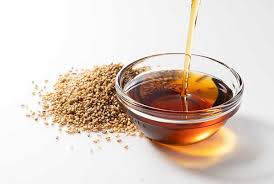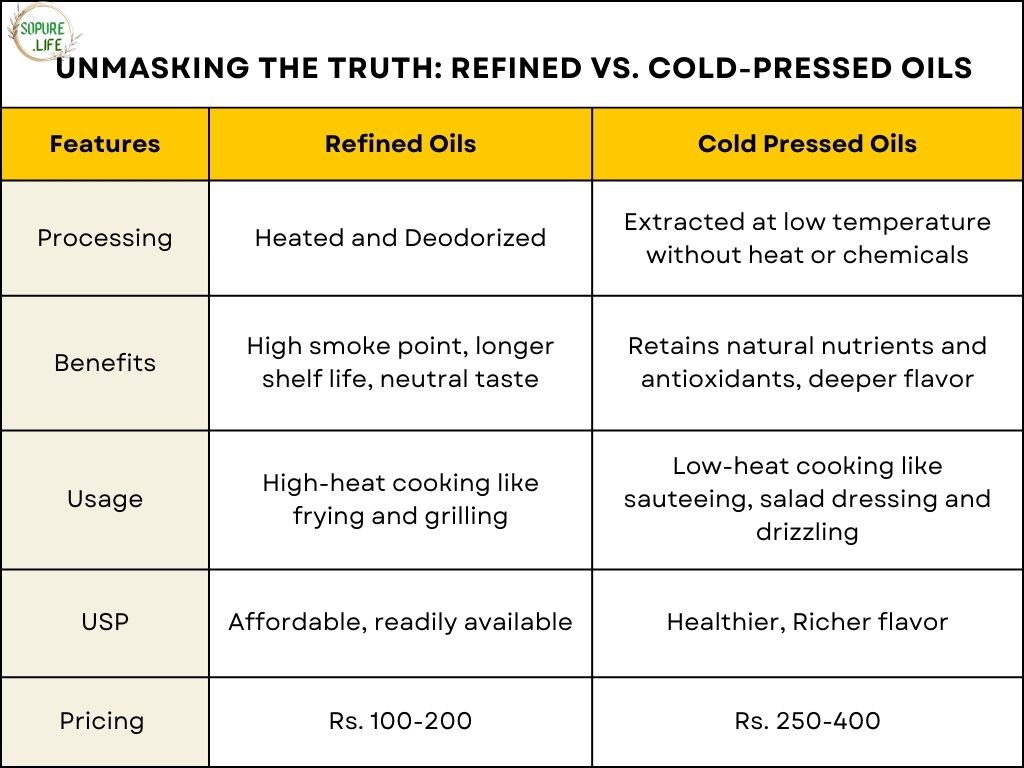Navigating Between Refined Oils and the Allure of Cold Pressed Oils
Among the myriad choices we face in cooking oils, cold pressed oils have emerged from the shadows to claim their throne. Gone are the days when cooking oil was a mere afterthought; it’s now a canvas for crafting culinary masterpieces and nurturing our bodies. So, join us as we embark on a flavorful exploration, delving deep into the intricacies of selecting the right cooking oil. In this edition, our spotlight shines on the timeless battle: Refined Oil vs. Cold Pressed Oil. Let’s unlock the mysteries and demystify the jargon to empower your culinary choices
Cold-pressed refers to the method of extraction used to obtain the oil from the source. Cold-pressed oils are made by mechanically pressing the oil out of the source, such as nuts or seeds, at a low temperature. This method preserves the oil’s natural flavor and nutritional value, resulting in a product free from chemicals and solvents. Cold-pressed oils are also known as extra-virgin or virgin oils.
On the other hand, normal oils are made by using heat and chemicals to extract the oil from the source. This process can strip the oil of its natural flavor and nutritional value. Normal oils are also known as refined or processed oils.

One of the main benefits of cold-pressed oils is that they retain their natural flavor, aroma, and nutritional value. Because they are not exposed to high temperatures or chemicals during the extraction process, cold-pressed oils are often considered to be of higher quality than normal oils. They are also often considered to be more pure and natural. Cold-pressed oils are also known to be higher in beneficial nutrients such as vitamins and minerals. Cold-pressed oils are also rich in antioxidants, which can help to protect the body from free radical damage and reduce the risk of chronic diseases.

Another benefit of cold-pressed oils is that they have a higher smoke point than normal oils. This means that they can be heated to higher temperatures without breaking down and producing harmful smoke or chemicals. This makes them ideal for cooking and frying. Normal oils, on the other hand, have a lower smoke point and are often less stable at high temperatures. They can also be exposed to chemicals and solvents during the extraction process, which can affect their nutritional value and safety.
In terms of taste, cold-pressed oils often have a stronger, more distinct flavor than normal oils. This makes them perfect for use in salad dressings, marinades, and other recipes that require a strong flavor. Normal oils, on the other hand, often have a milder flavor, making them better suited for use in recipes that require a neutral oil. When it comes to price, cold-pressed oils can be more expensive than normal oils due to the more complex and time-consuming extraction process. However, many people believe that the higher quality and nutritional value of cold-pressed oils make them worth the extra cost.
SoPURE life brings together a blend of natural, home made and authentic for maintaining a healthy lifestyle. SoPURE Life cold-pressed oils are considered to be of higher quality and retain more of their natural nutrients, flavor and aroma. They are also more stable at high temperatures and are often considered to be more pure and natural.
To explore some of the authentic 100% natural home made food products, click here
Unmasking the Truth: Refined vs. Cold-Pressed Oils

